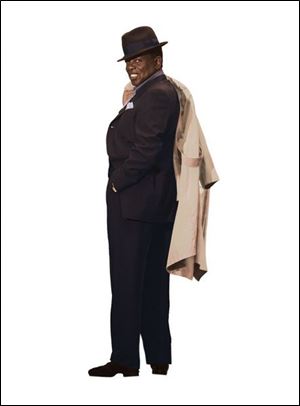
Lou Rawls: Toledo to hear 'silkiest chops'
1/9/2004
Lou Rawls performs with the Toledo Symphony tomorrow night at the Stranahan Theater.
Lou Rawls' latest release, "Rawls Sings Sinatra," pays tribute to Ol' Blue Eyes, the legendary crooner who once praised Rawls for possessing "the classiest singing and silkiest chops in the singing game."
But Rawls won't be focusing on the Sinatra project when he performs with the Toledo Symphony tomorrow night at the Stranahan Theater.
"That will be part of the show, but if I focused on it I would have to surpass all the stuff I've done before it," Rawls said in an interview from New Jersey. "And I've recorded 81 albums!"
A singer with a distinctively smooth and velvety voice, Rawls has earned three Grammy Awards, five Gold Records, and one Platinum Record and scored hits in the jazz, soul, blues, gospel, and pop genres.
"I had five albums in the Top 10 at the same time," he said proudly.
Rawls' long string of hits includes such classics as "You'll Never Find (Another Love Like Mine)," "Lady Love," "At Last," "A Natural Man," and "See You When I Git There."
He also provides the voice for Garfield the cat in TV specials, starred in a one-man Broadway show, had a part in Smokey Joe's Cafe on Broadway, and found success as an actor, performing in such films as Leaving Las Vegas, Driven, and Blues Brothers 2000 and in numerous TV programs including 77 Sunset Strip, Mannix, and Baywatch Nights.
Rawls was 8 years old when he began singing in a junior church choir in southside Chicago. One of his childhood buddies was Sam Cooke, a musical pioneer who was inducted into the inaugural class of the Rock and Roll Hall of Fame in 1986.
Rawls, who like Cooke was born in 1935, said the two future stars first met when they were 11 or 12. They later formed a quartet to sing gospel songs.
"He was great. He was the lead singer," said Rawls. "He was handsome and had all those girls flocking after him. Being in his presence was a good thing."
Rawls and Cooke scored a hit with their duet on "Bring It On Home" in 1962, but Rawls said he also sang backup on many of Cooke's recordings.
"They didn't put my name on it. They never paid me," he said. "But it's OK. We had been singing together since childhood. We harmonized well together."
He and Cooke were on a tour of the South as members of the Pilgrim Travelers gospel group in 1958 when they were involved in a horrendous car accident. One passenger was killed, Cooke was slightly injured, and Rawls was hurt so severely that he was pronounced dead while being transported to a hospital.
Rawls was in a coma for more than five days and it took nearly a year to recover.
"I really got a new life out of that," he said. "It gave me a whole different outlook. And thank God, because if it didn't happen I probably would have burned myself out like so many other people have done."
He said he began to learn about acceptance, direction, understanding, and perception, traits that he had overlooked in his life.
Cooke, who had 29 Top 40 hits including "You Send Me" and "Chain Gang," died tragically in a Los Angeles hotel shooting in 1964 under circumstances that remain mysterious and controversial.
Rawls made his recording debut in 1962 on Capitol Records, for which he recorded 20 albums in 10 years. His first hit was "Love Is a Hurtin' Thing," which went to No. 1 on the R&B charts and No. 13 on the pop charts in 1966. The song was nominated for two Grammy Awards.
The singer also became known for his hip spoken monologues, speaking the lyrics in a singsong that some observers have called a precursor to rap. He won his first of three Grammys in 1967 for a "rap" on "Dead End Street," taking home a trophy for Best R&B Vocal Performance.
But Rawls doesn't want to be known for contributing to rap, a genre that he believes does not qualify as music.
"How can you put those words together in the same sentence - 'rap' and 'music'?," he said. "I'm not putting it down, but can you really say that rap is music? What I did was storytelling. It had nothing to do with the 'rap attack.'<0x00A6>"
In 1979, Rawls created and starred in a telethon to raise money for the United Negro College Fund, which has raised more than $200 million for scholarships.
"It feels great because I look at the results," Rawls said. "We've been blessed to have some very productive people come out of this - mayors, doctors, lawyers, physicists. People have done really well in their chosen professions and the only reason they were able to fulfill their dreams was because of the college fund."
Lou Rawls will perform with the Toledo Symphony at 8 p.m. tomorrow in the Stranahan Theater, 4645 Heatherdowns Blvd. Tickets, $20 to $50, are available from the symphony at 419-246-8000 or toll free at 1-800-348-1253, online at www.toledosymphony.com, and at Thackeray's Books Westgate.